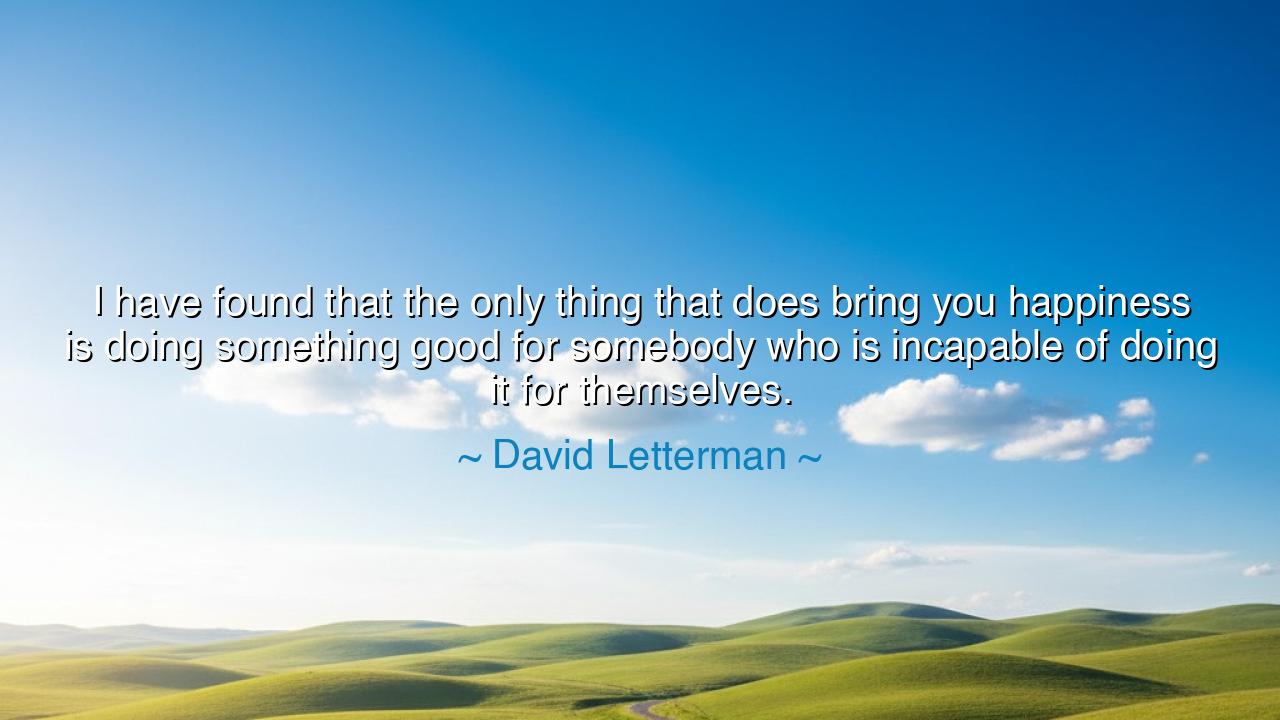
I have found that the only thing that does bring you happiness is
I have found that the only thing that does bring you happiness is doing something good for somebody who is incapable of doing it for themselves.






“I have found that the only thing that does bring you happiness is doing something good for somebody who is incapable of doing it for themselves.” Thus spoke David Letterman, the humorist and late-night philosopher of the modern age, a man who, behind the laughter and light, discerned a truth as ancient as the human soul. In this confession lies a revelation: that true happiness is not found in pleasure, fame, or comfort, but in the quiet, selfless act of service. The joy that endures does not spring from what we receive, but from what we give — especially when that gift lifts a burden from one who cannot return it. Letterman’s words are not merely sentimental; they are a torch passed from the wisdom of the ages, illuminating the path from self-centered desire to self-forgetful love.
The origin of this quote rests in Letterman’s own journey — a man who stood for decades before the cameras, bathed in applause, surrounded by success. Yet even amidst laughter and acclaim, he, like so many, came to realize that joy sought for oneself is fleeting. True fulfillment arrives only when the heart steps beyond its boundaries and reaches toward another. This is the paradox of life: that one must lose oneself to find oneself. To do good for those who cannot repay you — the poor, the forgotten, the voiceless — is to touch the divine. It is to act not for reward, but for the sheer dignity of compassion.
In his simple phrasing, Letterman reveals an eternal principle echoed by prophets, sages, and saints. The greatness of the human spirit lies in its ability to give without expectation. The act of helping one who is “incapable of doing it for themselves” is an act of grace, for it mirrors the boundless mercy of nature itself. The sun does not ask payment to shine, nor the rain to fall. So too should man, made in the image of compassion, give without counting the cost. For in that giving, he is freed — freed from the endless hunger of self-interest, freed from the emptiness of ego.
Consider the life of Mother Teresa of Calcutta, who spent her years among the dying and the destitute. She sought not riches, nor comfort, but souls — human souls starved of love. She once said, “If you cannot feed a hundred people, then feed one.” She gave herself to those who could never repay her: the abandoned child, the leper, the forgotten elder. And yet she glowed with a joy no gold could purchase. Her happiness was born not of ease, but of sacrifice, of doing good for those incapable of doing for themselves. In her, we see Letterman’s truth embodied: that the truest smile is not painted on the lips, but born from acts of love.
The wisdom here is not meant for saints alone; it is a summons to all. The modern world teaches us to chase happiness — through achievement, through wealth, through endless acquisition. But this pursuit leaves the soul weary, for happiness cannot be grasped directly. It is a byproduct of virtue, not a possession. To care for another — especially the helpless — is to step into a greater rhythm, to align oneself with the harmony of creation. The joy that follows such action is not loud or fleeting; it is deep, silent, and enduring, like the satisfaction of seeing a seed one has planted bloom long after one’s own hands have left the soil.
And yet, doing good for those who cannot repay is no easy path. It demands courage, humility, and faith. To help the helpless is to walk into the pain of the world with open eyes. It is to feel what others refuse to feel, to bear burdens not one’s own. But therein lies its power. Each act of selfless kindness strengthens the soul like fire hardens steel. The more one gives, the more one becomes — until the giver himself is transformed into a vessel of light. Such deeds ripple through time, unseen yet eternal, touching hearts long after the giver is gone.
So, dear listener, take these words not as sentiment, but as a sacred charge: seek happiness not in what the world promises, but in what the heart can offer. Look to the weak, the forgotten, the lonely — and serve them. Do not wait for gratitude; act from love alone. Help the child who cannot help himself, comfort the elder who has been cast aside, lend strength to the broken in spirit. For every act of selfless goodness is a step toward the true joy that cannot fade.
As David Letterman teaches, the richest happiness is not found in laughter’s echo, but in the quiet peace of a heart that has given freely. It is not the applause of men, but the whisper of the soul that says, “I have done good.” For in serving others, we touch the infinite — and in that touch, we find what all hearts have always sought: not fleeting pleasure, but the everlasting warmth of compassion, courage, and love.






AAdministratorAdministrator
Welcome, honored guests. Please leave a comment, we will respond soon